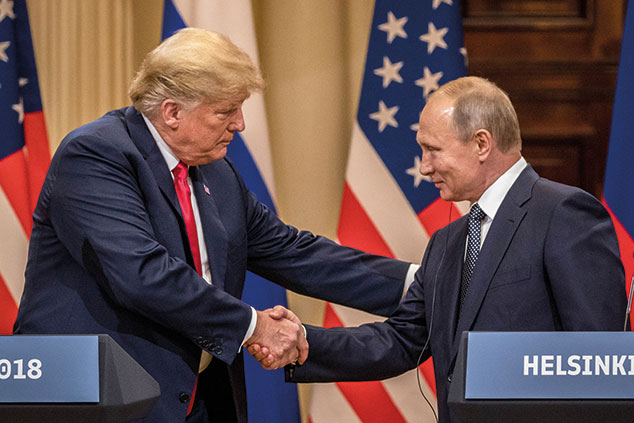
The Helsinki summit continues to raise questions about the US president. Emily Hohler reports.
The “furore” over Donald Trump’s “strikingly pliant stance” towards Vladimir Putin has shown little signs of abating, says Toby Harnden in The Times. Democrats attempted to have Trump’s interpreter from his one-to-one meeting with the Russian president subpoenaed. Republicans are “in uproar” about Trump’s support for Putin over US intelligence services and remain unconvinced by his “halting attempts to retreat” from his remarks.
Although Trump told CBS News that he held Putin personally responsible for Russia’s meddling in the US presidential election, he later appeared to revert to his previous position that Russian interference was a “story dreamed up by Democrats to excuse Hillary Clinton’s defeat”, says Stephen Collinson on CNN. He also renewed his criticism of Robert Mueller’s probe into the matter. These “incessant and often false attacks” suggest that he is afraid of its “ultimate conclusions”. The “most surreal aspect” of this latest controversy is the “intensifying public debate” over the idea that Trump may be “compromised by a hostile foreign power”.
Overreaction to Trump’s stumble
The reaction from the foreign-policy establishment has been almost as “untethered as Trump himself”, says Danielle Pletka in The Atlantic. John Brennan, a former director of the CIA, tweeted that his post-summit press conference was “nothing short of treasonous”; former presidential candidate Evan McMullin tweeted that Trump’s behaviour had “made his betrayal of American interests clear”. But while it’s easy to criticise Trump’s performance in Helsinki, the idea that he is “a Russian agent, is being blackmailed by Russia, or is a traitor bent on destroying America” is “crackers”.
Trump may be “shallow, vain, not terribly bright” and “lazy”, but he is “not the anti-Christ”. The current political and media outrage is overdone, agrees Ted Van Dyk in The Wall Street Journal. Any damage done in Helsinki “pales” in comparison to, say, the Yalta Summit at which Stalin got a “dying… Franklin Roosevelt to cede him eastern Europe”, or the Khrushchev-Kennedy Vienna Summit, which led to the Cuban Missile Crisis and Berlin Crisis.
Top Republicans need to act
Nevertheless, as the fallout becomes “ever more toxic”, Trump is “lashing out”, says Collinson. His latest “gambit” – which may be a “classic Trumpian distraction ploy” to “drown out” damaging stories – is to threaten to revoke the security clearances of six former national-security officials. “The wielding of presidential power to punish prominent critics would take this White House perilously closer to potential abuses of executive authority.”
It’s about time Congressional Republicans realised they are “not merely constitutional potted plants” and did something beyond making “mournful” cable TV appearances and issuing “disapproving tweets”, says Charles Sykes in The New York Times. Their reluctance to act is understandable. Breaking “too decisively” with Trump “risks offending the base and perhaps inviting a primary challenge”.
But the “damage is real” – and now Trump wants Putin to come to Washington. There is plenty that elected members can do, from passing legislation imposing new sanctions on Russia in the event of future attacks on the democratic process to reaffirming that no one, not even the president, is above the law. Such action would go a long way towards “demonstrating that Republicans have not lost their souls as well as their spines”.
Israel’s controversial “apartheid” law
Last week Israel’s parliament passed a controversial law declaring that Israel is the historic homeland of the Jewish people and that only Jews have the right to “national self-determination”. It establishes Hebrew as the official language and asserts that Jewish settlement is a national value, says Emma Green in The Atlantic. The nation-state bill will become one of Israel’s Basic Laws, which, in the absence of a constitution, govern the country. There has “rarely been a more propitious moment” to pass this law, says the Financial Times, with nationalism on the rise across the world and Trump in the White House.
Palestinian citizens, who comprise around 20% of the population, have “every right to be angry”, says The Guardian. The law “implicitly subordinates the country’s democratic nature to its Jewish nature”. Israeli Arabs say it will make them officially second-class citizens. Arab-Israeli MPs denounced it as “apartheid” and tore up copies after it was passed, says Raf Sanchez in The Daily Telegraph.
The “hand-wringing and denunciations” are predictable but unwarranted, says Eugene Kontorovich in The Wall Street Journal. In reality, this law “would not be out of place among the liberal democratic constitutions of Europe, which include similar provisions that have not aroused controversy. The law does not infringe on the individual rights of any Israeli citizen, including Arabs; nor does it create individual privileges”. There are seven European states, including Latvia, which has a Russian population of around 25%, that have similar “nationhood” constitutional provisions.
In practice, the law won’t make much difference, says Green. A fifth of the population won’t stop speaking Arabic. However, it is a “stick in the eye” to Israel’s Arab minority and it makes the prospect of a peace deal between Israelis and Palestinians even more unlikely than before.